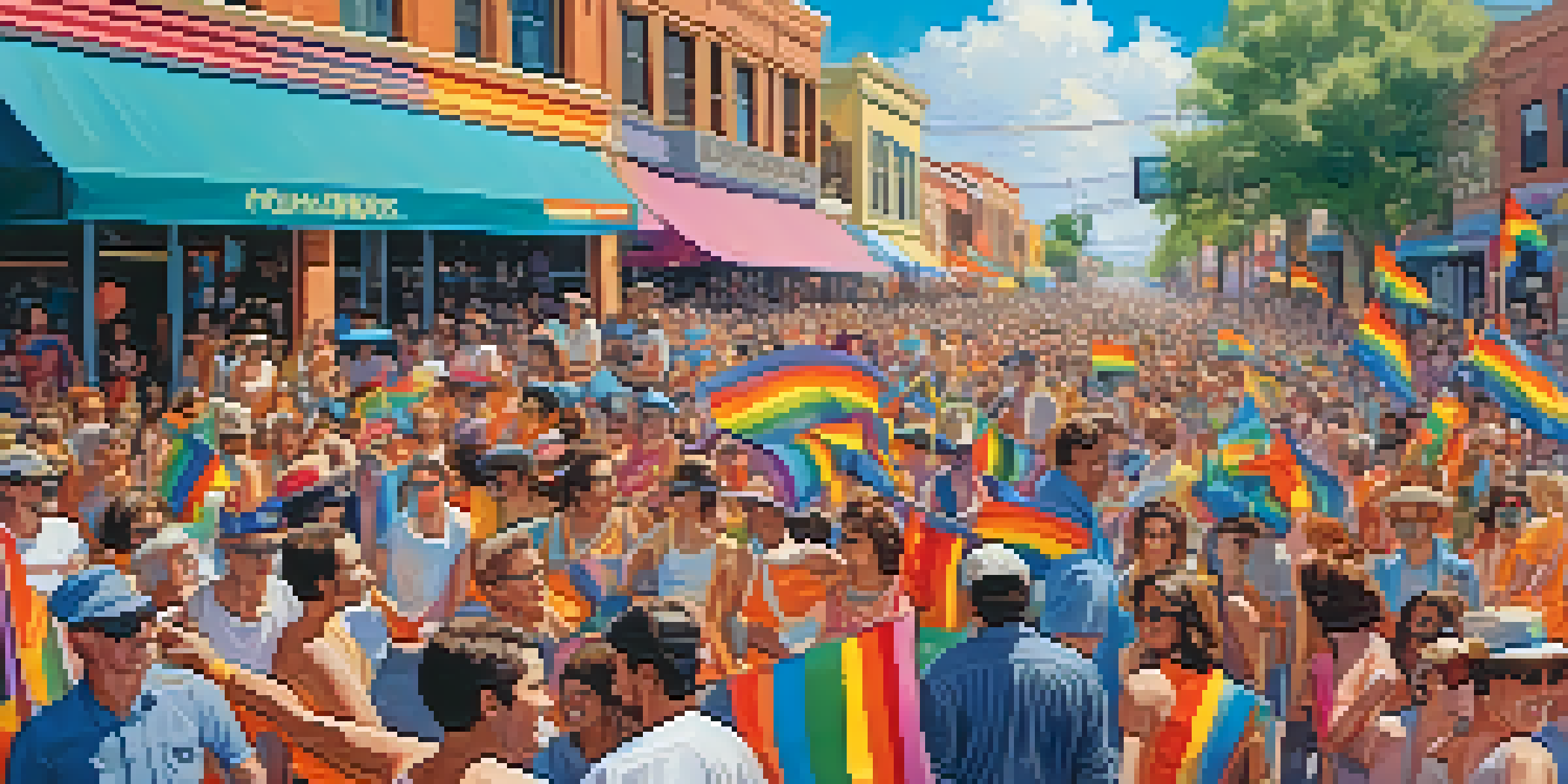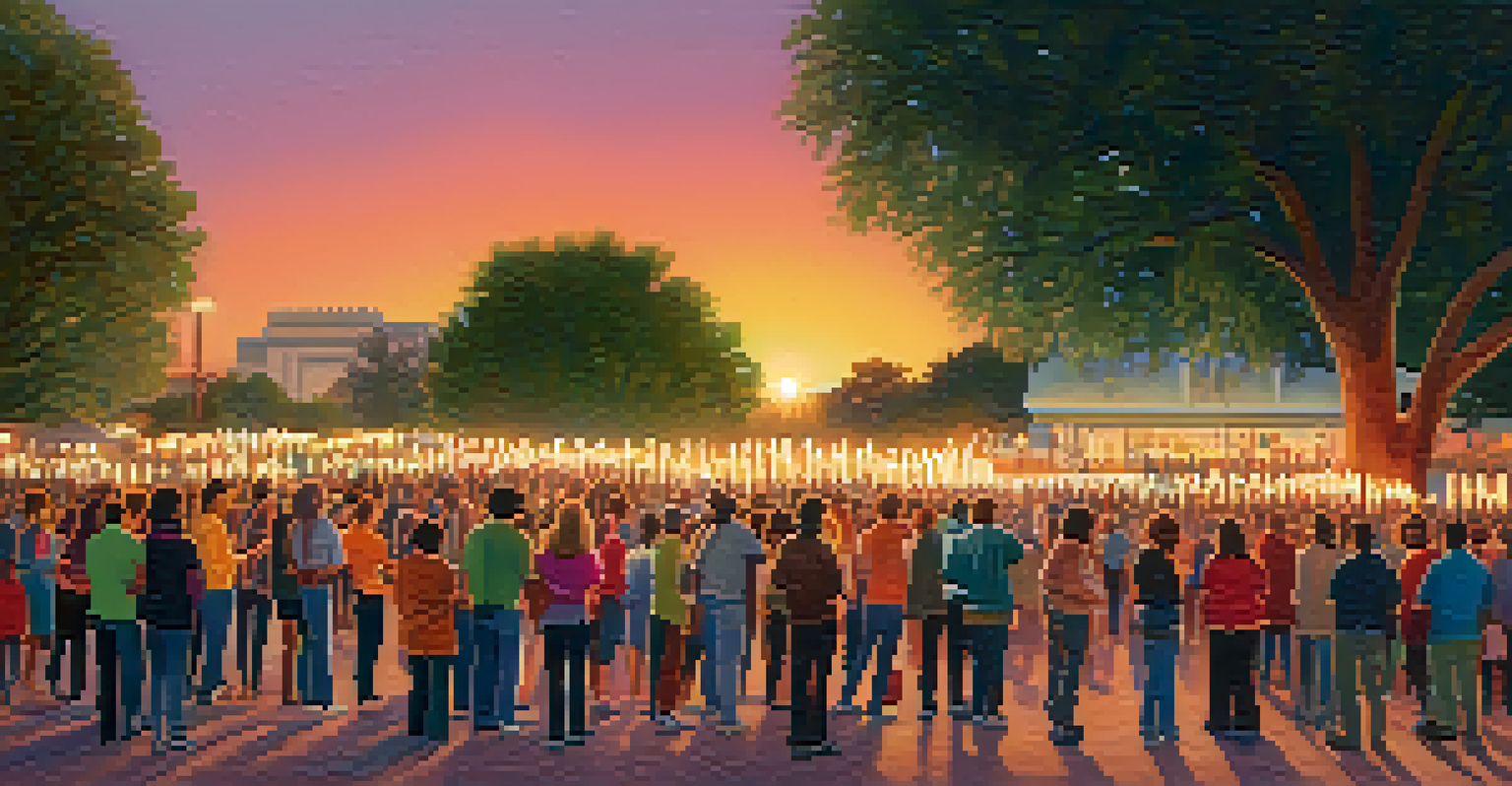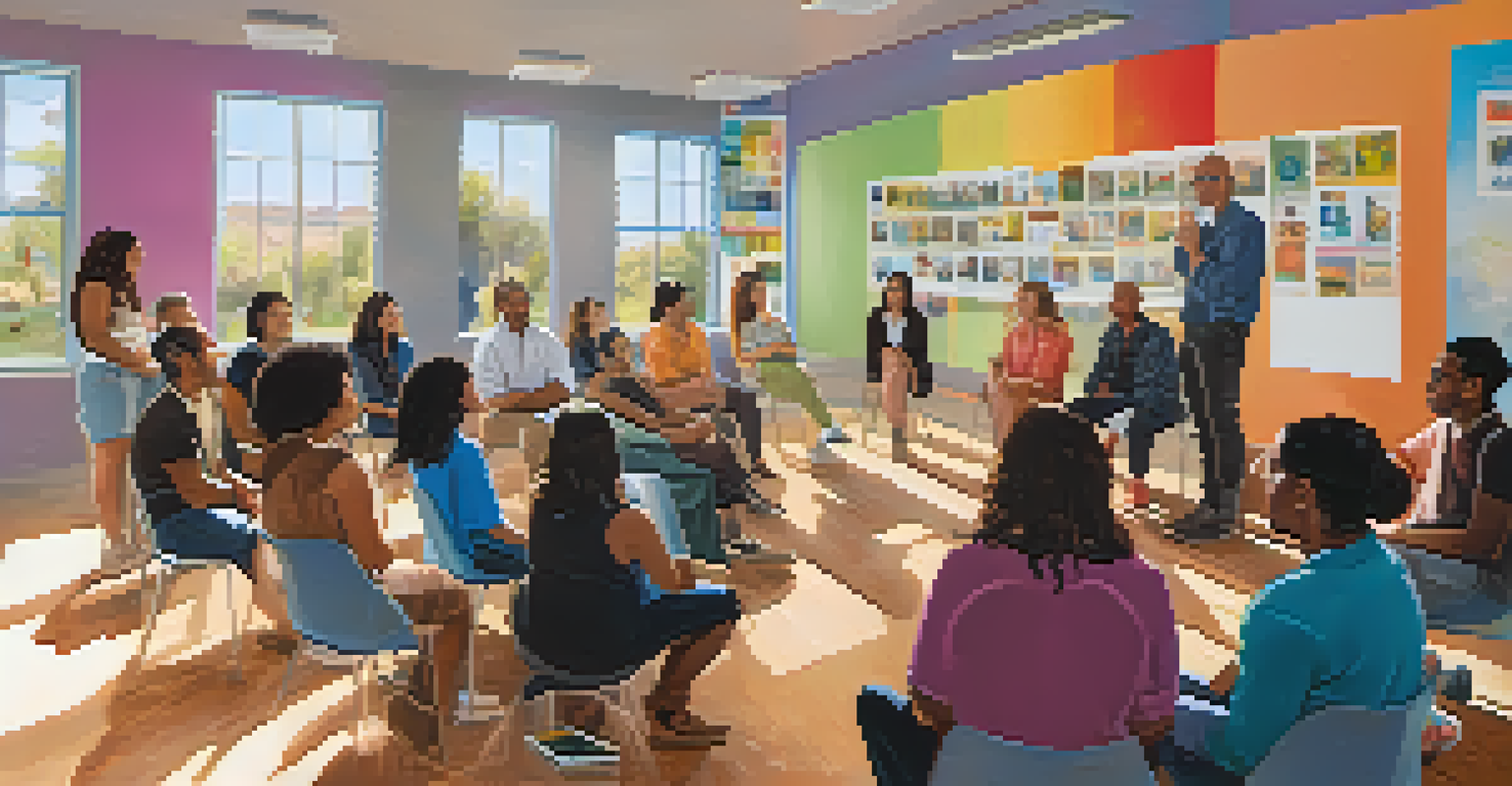Pivotal Moments in Tucson's LGBTQ+ Rights Movement History

The Early Struggles: 1970s LGBTQ+ Activism in Tucson
In the 1970s, Tucson saw the emergence of its first LGBTQ+ organizations, marking a significant shift in community visibility. Activists began organizing rallies and meetings to advocate for equal rights, creating a platform for voices that had long been marginalized. The formation of groups like the Gay Liberation Front brought together individuals who were passionate about fighting for social justice and equality.
Injustice anywhere is a threat to justice everywhere.
These early efforts were met with resistance, as societal norms at the time heavily discriminated against LGBTQ+ individuals. However, the courage displayed by these activists laid the groundwork for future movements, fostering a sense of community and shared purpose. Events like the first Pride Parade in Tucson in 1977 galvanized support and increased awareness of LGBTQ+ issues.
The resilience of these activists not only created a sense of solidarity within the LGBTQ+ community but also began to change public perception. Their determination challenged the status quo and encouraged others to join the fight for rights and acceptance. This period was a crucial catalyst for Tucson's evolving LGBTQ+ rights movement.
Establishing Pride: The First Tucson Pride Celebration
The inaugural Tucson Pride celebration in 1977 was a landmark event that celebrated LGBTQ+ identity in a vibrant, public way. It was a bold declaration of existence and pride, allowing community members to express themselves freely. This event also served as a rallying point, uniting various factions of the LGBTQ+ community under a shared banner of acceptance and love.

With colorful parades and lively events, Tucson Pride not only showcased the diversity of the LGBTQ+ community but also attracted allies and supporters from outside the community. This visibility was crucial in fostering understanding and acceptance among the broader public. The success of the first Pride laid the foundation for annual celebrations that continue to this day.
Foundations of LGBTQ+ Activism
The 1970s marked the emergence of LGBTQ+ organizations in Tucson, laying the groundwork for future advocacy and community solidarity.
Over the years, Tucson Pride has grown significantly, reflecting the changing attitudes towards LGBTQ+ rights in society. This celebration has become more than just a parade; it’s a testament to the progress made and a reminder of the work still needed to achieve full equality. The event symbolizes both joy and resilience, embodying the spirit of Tucson's LGBTQ+ movement.
Legal Milestones: The Fight for Marriage Equality
The fight for marriage equality was a defining moment in the LGBTQ+ rights movement, and Tucson played a vital role in this national struggle. As states began to legalize same-sex marriage, activists rallied to ensure Arizona would not be left behind. The push for legal recognition of same-sex relationships galvanized the community, with protests and advocacy campaigns gaining momentum throughout the 2000s.
The most powerful weapon we have as advocates for our own rights is our own stories.
In 2014, a significant victory was achieved when a federal judge ruled that Arizona's ban on same-sex marriage was unconstitutional. This ruling was the culmination of years of hard work and dedication from local activists who fought tirelessly for equal rights. The decision was celebrated across Tucson, as couples could finally tie the knot with legal recognition.
The legalization of same-sex marriage in Arizona was not just a legal victory; it marked a cultural shift in acceptance and support for LGBTQ+ rights. This moment helped further solidify Tucson’s reputation as a progressive city, fostering an environment where love and diversity could flourish. It also inspired other states to follow suit, demonstrating the power of grassroots activism.
Advocacy and Health: The Response to the AIDS Crisis
The AIDS crisis of the 1980s had a profound impact on the Tucson LGBTQ+ community, prompting urgent action and advocacy. Local organizations emerged to provide support for those affected by the disease, offering medical assistance and emotional counseling at a time when stigma was rampant. This crisis galvanized the community, leading to increased activism and awareness around LGBTQ+ health issues.
As the epidemic unfolded, Tucson activists worked tirelessly to educate the public and fight for healthcare resources. They organized events, fundraisers, and awareness campaigns that not only raised money but also provided crucial information about prevention and treatment. This grassroots response became a model for other cities facing similar challenges.
Legal Progress for Marriage Equality
Tucson played a key role in the national fight for marriage equality, culminating in the 2014 ruling that legalized same-sex marriage in Arizona.
The work done during the AIDS crisis laid the groundwork for ongoing health advocacy within the LGBTQ+ community. It highlighted the importance of accessible healthcare and contributed to a broader understanding of LGBTQ+ health issues, emphasizing the need for inclusivity in medical treatment. Tucson’s response to the crisis remains a powerful example of community resilience and solidarity.
Trans Rights Advocacy: Raising Visibility in Tucson
The fight for transgender rights gained momentum in Tucson during the early 2000s, as community members began to push for greater visibility and understanding. Activists organized events and educational workshops to raise awareness about transgender issues, addressing the discrimination and violence faced by transgender individuals. This grassroots effort fostered a sense of community and support that was essential for those navigating their identities.
In 2016, Tucson made headlines by becoming one of the first cities in Arizona to implement non-discrimination policies that included gender identity. This was a monumental step forward, as it provided legal protections for transgender individuals in housing, employment, and public accommodations. Such policies not only affirmed the rights of the transgender community but also sent a strong message about the importance of equality.
The increased visibility of transgender issues in Tucson has inspired ongoing advocacy and support networks. Local organizations continue to work tirelessly to address the unique challenges faced by transgender individuals, ensuring that their voices are heard and their rights are protected. This evolution reflects the broader LGBTQ+ movement's commitment to inclusivity and equality for all.
Intersectionality: Supporting LGBTQ+ People of Color
In recent years, Tucson has made strides towards recognizing and supporting the intersectionality within the LGBTQ+ community, particularly for LGBTQ+ people of color. Activists have emphasized the importance of acknowledging the unique challenges faced by individuals who belong to multiple marginalized groups. This focus on intersectionality has fostered a more inclusive environment, encouraging dialogue and solidarity across diverse identities.
Local organizations have begun to create specific programs and initiatives aimed at supporting LGBTQ+ people of color, recognizing that their experiences often differ from those of their white counterparts. By providing resources and safe spaces, these initiatives have empowered individuals to share their stories and advocate for their rights. This approach not only strengthens the community but also enriches the broader fight for equality.
Embracing Intersectionality
Recent efforts in Tucson highlight the importance of supporting LGBTQ+ people of color, fostering inclusivity and addressing unique challenges within the community.
The emphasis on intersectionality in Tucson’s LGBTQ+ rights movement has sparked important conversations about privilege and representation. By uplifting the voices of LGBTQ+ people of color, the community is better equipped to address systemic inequalities. This movement towards inclusivity reflects a commitment to ensuring that all members of the LGBTQ+ community are acknowledged and supported in their fight for justice.
Continuing the Fight: Current Challenges and Future Goals
While Tucson has made significant progress in LGBTQ+ rights, challenges remain that require ongoing advocacy and activism. Issues such as discrimination, healthcare access, and violence against LGBTQ+ individuals continue to impact the community. Local activists and organizations are committed to addressing these challenges head-on, ensuring that the hard-won rights are not taken for granted.
The recent rise in anti-LGBTQ+ legislation across the United States has also heightened concerns within the Tucson community. Activists are mobilizing to combat these threats, emphasizing the need for vigilance and unity. This current climate has sparked renewed energy around grassroots organizing, as community members come together to advocate for equality and justice.

Looking to the future, Tucson’s LGBTQ+ rights movement aims to build on its history while addressing the evolving needs of the community. By focusing on education, advocacy, and solidarity, the movement seeks to create a more inclusive and equitable environment for future generations. The ongoing fight for rights and recognition is a testament to the resilience and determination of Tucson's LGBTQ+ community.